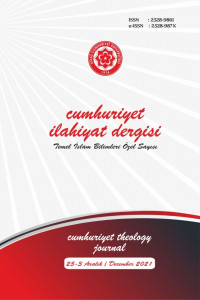Ahmet Cevdet Paşa’nın Kur’ân Tercümesine Yazdığı Muḳaddime ile Lüġāt-i Ḳurʾâniye Ḥaḳḳında Lâḥika-i Şerîfe İsimli Eserinin Tahlili, Kaynaklarının Tespiti ve Terceme-i Şerîfe’siyle Karşılaştırılması
Analysis of Aḥmed Cevdet Pasha’s Preface to the Translation of The Qurʾān, and His Work Named Lüghāt-i Ḳurʾāniye Ḥaqqında Lāḥiqa-i Sharīfa, the Examination of Its Sources and Comparison with his Terjeme-i Sharīfa
Author(s): Murat KayaSubject(s): Semiotics / Semiology, Islam studies, Lexis, Semantics, Qur’anic studies
Published by: Cumhuriyet Üniversitesi İlahyat Fakültesi
Keywords: Tafsīr; Aḥmed Cevdet Pasha; Lāḥiqa-i Sharīfa; Terjeme-i Sharīfa; Qurʾān; Lexicon;
Summary/Abstract: Aḥmed Cevdet Pasha (d. 1312/1895) is one of the influential and prominent Ottoman scholars in history and law. Besides history and law, he also produced works on literature, sīra (the life of the Prophet) and tafsīr (the Qur’anic exegesis). In the last years of his life, Cevdet Pasha aimed to translate the Qurʾān including short comments on the verses, but this work was remained limited to the sūrah al-Baqara. Correspondingly to this translation named Terjeme-i Sharīfa, he prepared a glossary to the Qurʾān called Lāḥiqa-i Sharīfa for expressions and terms that require detailed explanation. Hereby, this work could only include the sūrah al-Baqara. After Cevdet Pasha’s death, his books passed to his daughter Ms Fāṭima ʿAliyye (d. 1936). The director of the Library of Maʿārif, Nācī Qāsim (d. 1963) gave a deed stipulating that he would take the first part of the Lāḥiqa-i Sharīfa and Terjeme-i Sharīfa from her and return them as they are. Later on, he published only the Muqaddima (introduction) and Lāḥiqa-i Sharīfa in the work named Tercemeli Ḳurʾân-ı Kerîm (İstanbul: 1927). Placing the Muqaddima at the beginning of the book and Lāḥiqa-i Sharīfa at the end misled some people by making them to think that the translation belongs entirely to Cevdet Pasha. Sulayman Tevfīq reprinted these two works together within his translation named el-Beyān fī ʾāyāti’lQurʾān in 1928. Terjeme-i Sharīfa has not been published anywhere else. Emine Armağan recently found and published a notepad in which Cevdet Pasha wrote Terjeme-i Sharīfa, mentioned Muqaddima and Lāḥiqa-i Sharīfa. In her book Emine Armağan printed the pages belonging to Cevdet Pasha as thumbnails, but she did not publish them in Latin. In this article, Muḳaddime and Lâḥika-i Şerîfe are Latinized and compared to the Terceme-i Şerîfe. The relevant parts of the translation are given in the footnotes. This study is an attempt to determine to what extent the translation in the manuscript form corresponds to the glossary and the soundness of relating the text to the author. In addition, many errors in the Ottoman edition of the glossary were also corrected. In the Muqaddima, Cevdet Pasha draws attention to the necessity of God’s existence, the illiteracy and the trustworthiness of his Messenger, and that the revelation is the primary source of knowledge for people. He summarizes the process of the Qurʾān’s revelation, notification and compilation. He briefly touches on the issues related to ʿUlūm al-Qurʾān. Cevdet Pasha, who passed from here to the miracle of the Qurʾān, talks about the qadim (pre-existing) nature of the divine word and teḥaddī. Cevdet Pasha emphasizes that understanding the Qurʾān is possible only by knowing the Arabic language very well and whithout this knowldege the Qurʾān cannot adequately be translated into another language. On the other hand, he also believes that the first meanings can be externally translated in order to explain the first meanings of the verses to those who do not know Arabic. Cevdet Pasha’s preface is considerably concise in structure. He shortly pointed to the crucial issues in one sentence and passed to the other subjects. While writing Terjeme-i Sharīfa, Cevdet Pasha left the extensive explanations of the polysemous words and terms that cannot be translated literally to the tafsīr and Lāḥiqa. Cevdet Pasha’s Lāḥiqa-i Sharīfa is entirely original and not merely a translation of any Qurʾānic dictionary. He compiled the meanings of a word existing in different verses, and he was very meticulous in choosing the meanings the words. He summarized very detailed informations in the sources in a simple, concise and fluent style. The arrangement of the words was based on the abbreviated versions used in the Qurʾān. In addition to the lexical meaning of the word, he sometimes mentioned the words’ roots, form, singular and plural forms, ism al-fāʿil, ism al-mefʿūl, ism al-mekān, synonym/antonym, lexical aspects, the meaning and terminology it expresses in different recitations of the Qur’an (alqırāat). He in particular highlighted if the word is one of the al-asmāʾ al-ḥusnā. He explained the changes in the meaning of a word when it is used for Allah or for humans. He shortly touched on the legal rulings. Cevdet Pasha clearly expressed in his work the most vital issues that the community should know without tiring the general reader of scientific disputes, philosophical discussions and literary analysises. Cevdet Pasha did not refer to any sources in his work and did not mention the transmission chain of the narrations. As a result of our research, we determined that he benefited from the commentaries of al-Zamakhshari (d. 538/1144), al-Rāzī (d. 606/1210), al-Qurṭūbī (d. 671/1273) and Beyḍāvī (d. 685/1286). We have seen that there are some similarities between the explanations of the words in the Lāḥiqa-i Sharīfa and the famous Qurʾānic dictionaries such as al-Mufredāt, Umdet al-ḥuffāẓ and Beṣāir. Cevdet Pasha’s wide knowledge on both Arabic and Turkish languages and the fact that he wrote this work when he was at the peak of his scientific career enabled him to give a very accurate and original construe to the words of the Qurʾān.
Journal: Cumhuriyet İlahiyat Dergisi
- Issue Year: 25/2021
- Issue No: 3
- Page Range: 1021-1043
- Page Count: 23
- Language: Turkish

